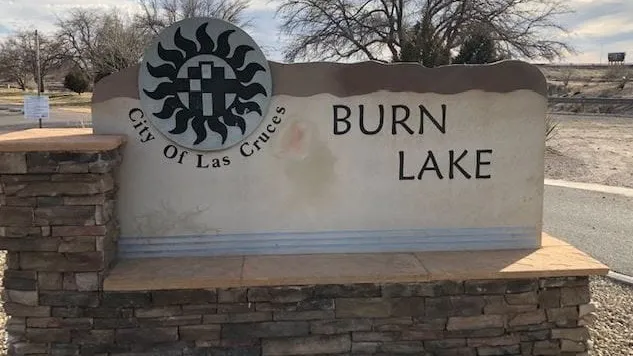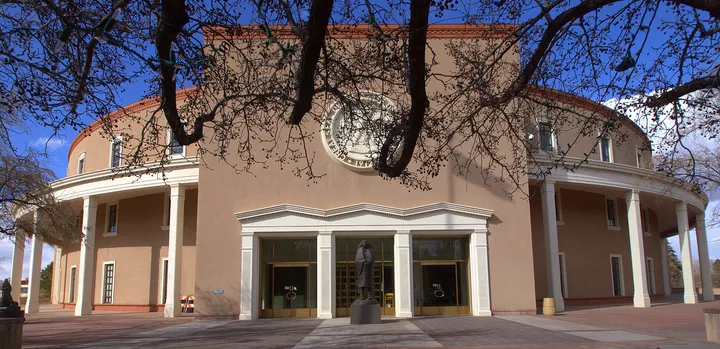The progressive who’s riding into the wind
Las Cruces Rep. Angelica Rubio’s journey from community organizing to the Roundhouse reflects her progressive vision for New Mexico politics, as profiled by Searchlight New Mexico.
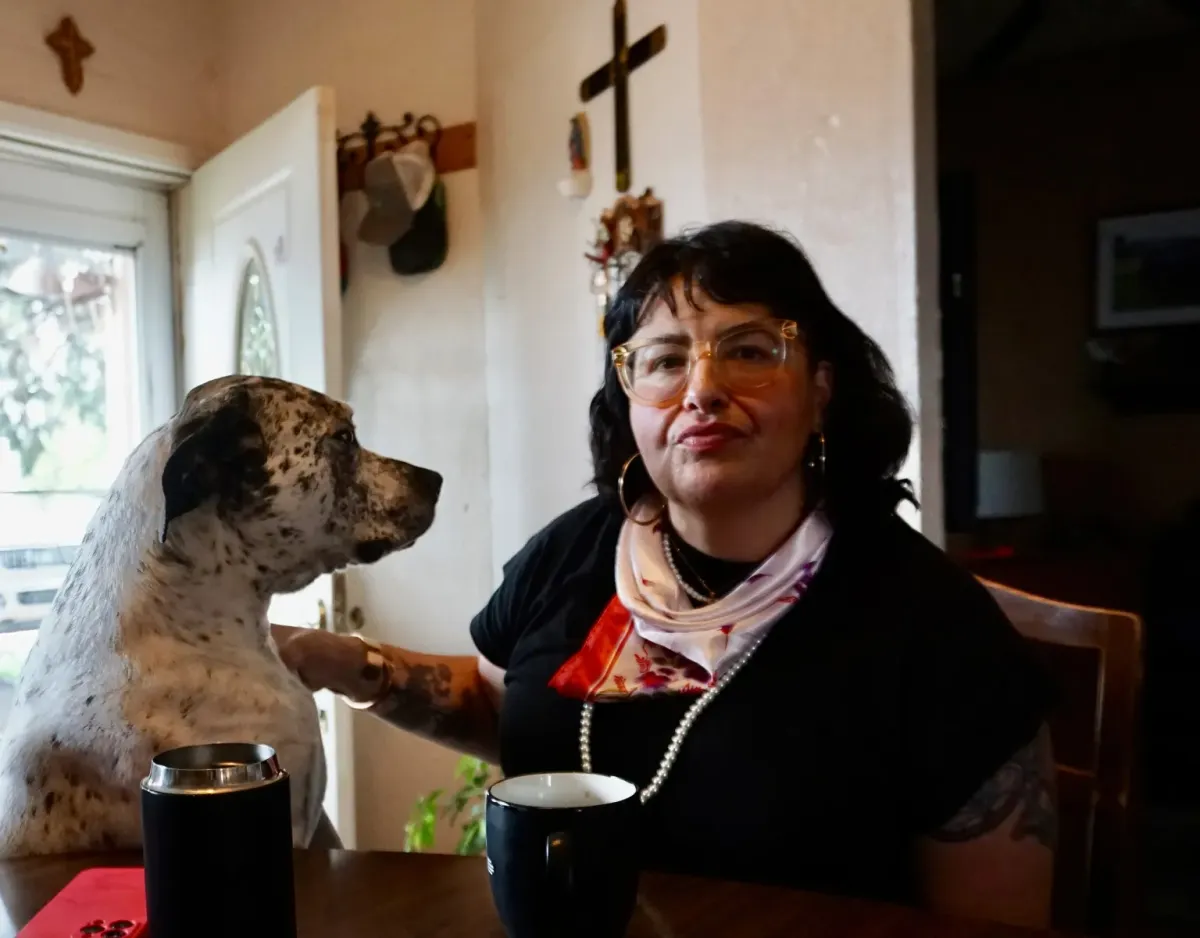
Even in blue New Mexico, state representative Angelica Rubio is seen as idealistic — but her strong stances have also helped cross political divides
Molly Montgomery, Searchlight New Mexico
This article was originally published by Searchlight New Mexico.
On a Saturday morning in early January 2019, the week before the start of the New Mexico legislative session, state representative Angelica Rubio rushed out of her house into the weak light of dawn.
This was her second 60-day session: she was elected as a Democrat in 2016 to serve a diverse, dense section of Las Cruces. Now she was leaving the southern city for Santa Fe to sponsor bills aimed at increasing access to outdoor recreation; making public single-occupancy restrooms gender-free; preventing the state from using resources to build the border wall; protecting refugee children from detention and separation from their parents; and requesting a study to reduce recidivism rates among people who’d been incarcerated.
I don’t want to go to bed at night and look at myself in the mirror and feel bad about a vote or something that I said. I get this feeling where, if I don’t say the thing, my body basically tells me that I have to say it. I feel this warmth or this hotness in my belly.”
— Rep. Angelica Rubio
To get to the Roundhouse, she decided to ride her bicycle. At various towns along the roughly 300-mile stretch between Las Cruces and Santa Fe, she planned to host conversations with constituents. She was trying to make the distances between communities in southern and northern New Mexico difficult to ignore. She was also trying to show that it’s possible to form connections across them.
But in the cold morning, she didn’t want to go.
She climbed onto her blue mountain bike, the flag of New Mexico strapped across its frame, and pedaled to Klein Park, a city park where members of the Piro-Manso-Tiwa tribe had gathered to bless her. They chanted and lit sage. Fellow cyclists pulled up to ride with her out of town.
“I started bawling,” she says. “It was overwhelming, because I just didn’t realize that that many people would show up to ride their bikes with me.”
They took off from the park. In the crowd were two tall, blonde friends of hers, Susan Singley and Hayley Clifford, who would accompany her the whole way. She calls them the Swedish bodyguards.
Rubio was so nervous that she sped far ahead of the crowd. As she peeled off her layers, passersby could see a tattoo on her left shoulder: a new one that depicted a determined buffalo riding a bicycle. Lately she’d been dreaming about buffalo. Friends told her that they run into storms to get through the wind and the water; if they run from storms, they overtake them.
“Preparing for the legislature, preparing for the ride,” she says, “that buffalo just became a metaphor.”
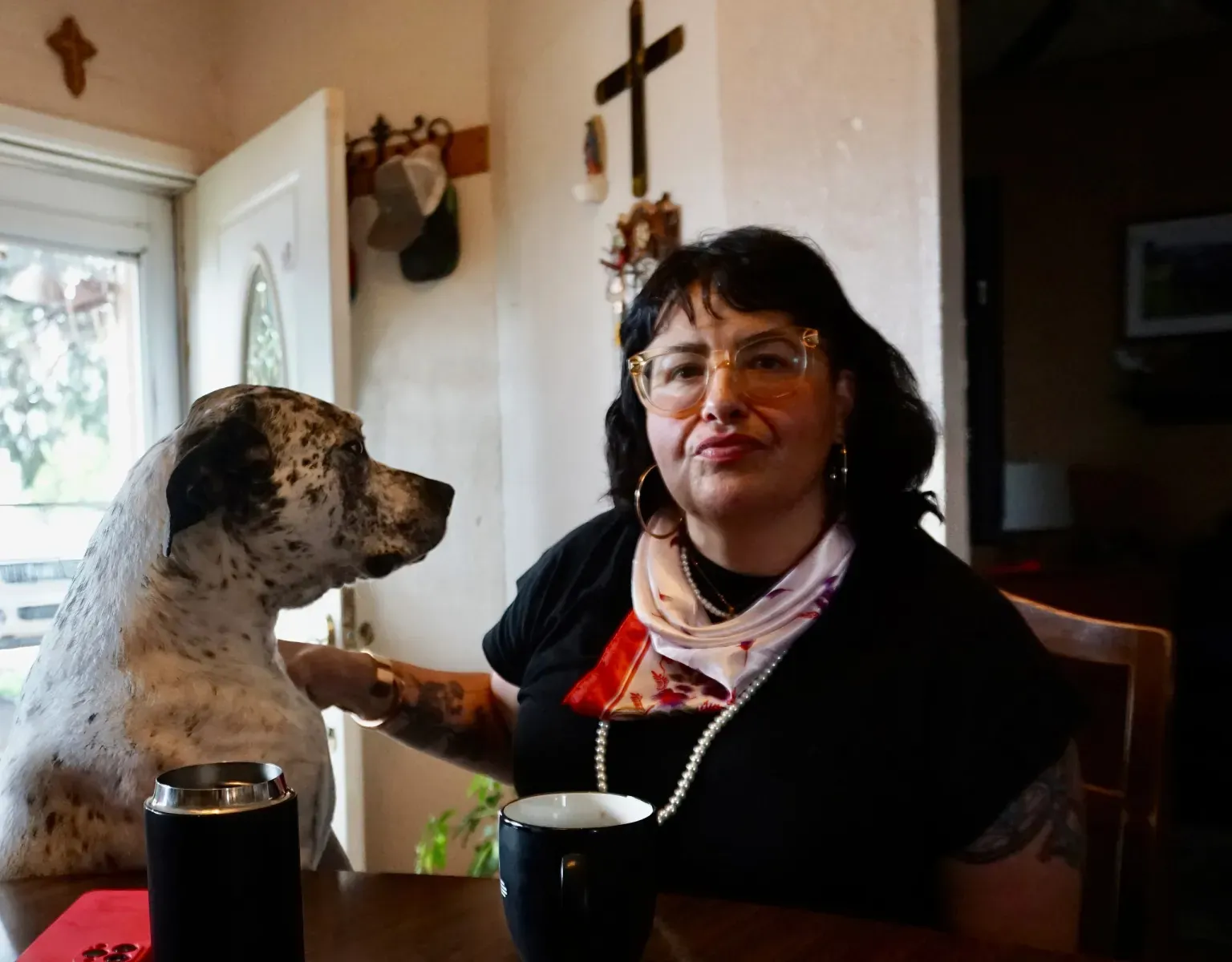
Across the great divide
Throughout the near-decade that she’s served, Rubio has been trying to bridge several divides, not just the gap between southern and northern New Mexico. She’s asking questions about tensions between rural and urban voters; conflicts that the MAGA movement has created inside Latino communities; differences among progressive and centrist Democrats; inequities between male and non-male leaders; and the distances constituents feel between themselves and their elected officials.
These are not abstract questions for her. She grew up in a rural community — Lake Arthur, between Artesia and Roswell — organized for housing justice in Los Angeles and now lives in Las Cruces. She comes from a Latino family, several of whom are immigrants and some of whom voted for Trump. She’s considered one of the most progressive lawmakers in New Mexico and faces headwinds from other Democrats as she tries to accomplish her agenda. She’s a member of the first majority-female legislature in New Mexico history; her day job is directing the New Mexico branch of a nonprofit, Vote Run Lead Action, dedicated to training women how to run for office. She hears her loved ones talk about how they see their senators and representatives rarely, if ever.
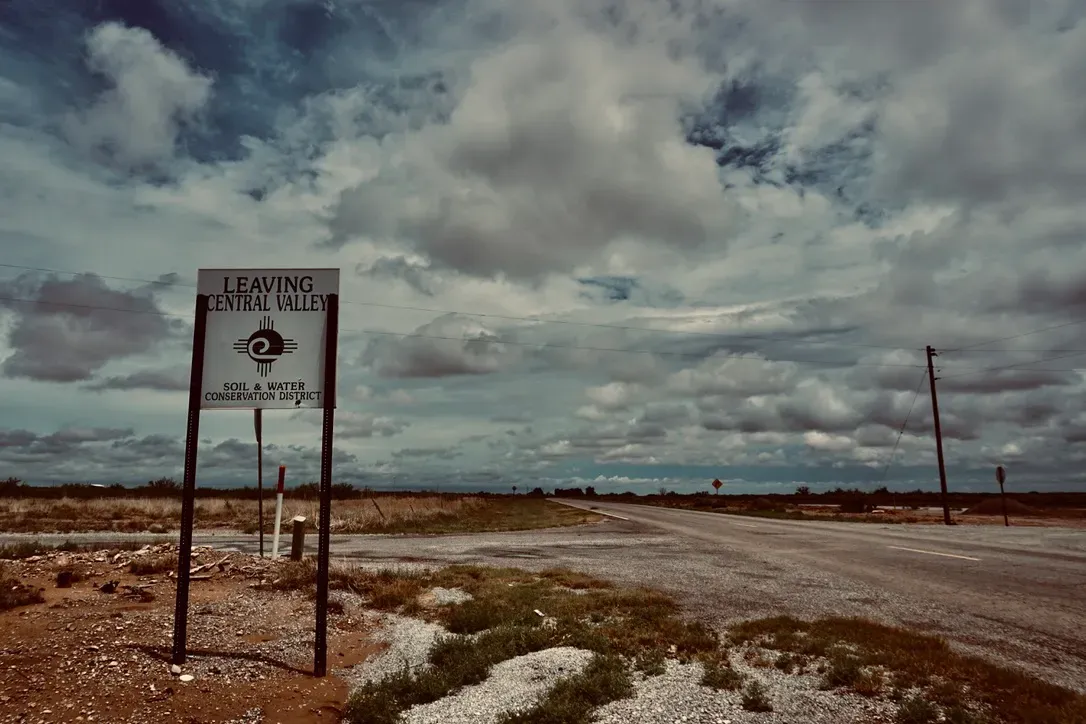
“She is so well-positioned at the intersections,” says progressive policy expert Nayomi Valdez, former public policy director at the ACLU.
As political consultants have watched voters swing to support Trump, and leaders across the board have shifted farther to the right, progressive politicians all over the United States have been asking whether progressive ideals are too lofty and to the left for most voters — whether they should surrender pieces of their agendas to hold onto them.
Rubio hasn’t budged, a stance that hasn’t lost her votes so far — she has consistently won general elections by around 20 percent or more. She often quotes the line, “Your liberation is bound up with mine” — a statement attributed to the Indigenous Australian activist Lilla Watson — a reminder that there’s no real distance between her life and the lives of her constituents.
Endorsing less-stringent policies on climate change and a militarized response to immigration, voting for harsh prison sentences, accepting the state’s reliance on extractive industry — any of these concessions, Rubio believes, would jeopardize the health and safety of New Mexicans.
“I don’t want to go to bed at night and look at myself in the mirror and feel bad about a vote or something that I said,” she says. “I get this feeling where, if I don’t say the thing, my body basically tells me that I have to say it. I feel this warmth or this hotness in my belly.”
She dislikes schmoozing. During sessions, she takes care of her dog, Yoko, instead of going out with lobbyists. “Lobbyists already know that I’m not gonna engage, so I don’t really get their invites anymore,” she says. “There’s this unspoken rule: ‘Rubio is gonna say no.’ I made that pretty clear early on.”
“She’s gonna bring up the hard issues in committee and the unpopular perspectives,” says journalist Laura Paskus, who met Rubio while reporting a New Mexico PBS story about how the border wall harms wildlife. Conversations with Rubio drew Paskus’s attention to the beauty of border communities, often maligned by people who live elsewhere. “I know that Representative Rubio feels the issues when she leaves the committee meeting, when she goes home, when she’s on a bike ride, when she’s trying to sleep at night,” Paskus says.
Several of Rubio’s fellow lawmakers look to her to figure out what moral course to chart. “It’s such a clear line as to where she stands on an issue,” says Representative Andrea Romero (D-Santa Fe). “I think that’s why so many people want to look to her to get a read.”
Carrie Hamblen (D-Las Cruces), the senator for Rubio’s district, says she regularly checks in with Rubio about decisions. Recently, planning a capital outlay workshop, she asked Rubio what she thought about law enforcement officers being present for security, given the recent shootings of lawmakers in Minnesota. Rubio mentioned that many community members feel less safe around law enforcement officers, because of police attacks on people of color.
“I was really grateful to her for bringing that perspective,” Hamblen says. “She’s really looking at it from the lens of people who have been disenfranchised, who have been ignored and who don’t feel that they have a voice.”
Rubio’s refusal to yield, however, can also lead legislators to disregard her. Action on several of her bills has been indefinitely postponed, while others have gotten stuck in committee. The most recent session, she says, was especially demoralizing.
“I’ve had legislators tell me, ‘You are my moral compass,’” she says. But “when legislation is being considered, it’s kind of like, ‘We have the votes without Rubio.’”
It’d be easy to mistake Rubio’s strong stances as a kind of rigidity — except that she’s also known for being an artist. She never stops exploring ideas and asking questions, particularly through writing. She’s working on a play about her family and for many years kept a blog filled with playful, self-deprecating jokes. Her moral positions are the result of intense introspection and internal deliberation.
“I think that people maybe assume that because she’s so solid in her values that she doesn’t grapple with things,” says Valdez. “Folks who don’t want to take her perspective seriously use that as a cop-out. Like, ‘Oh, she’s just gonna be a rabble rouser.’ But really, it’s that she grappled with it, and this is where she comes out every time. She’s just not afraid.”
Homesickness
In the afternoon on Saturday, around Hatch, as Rubio navigated the gentle curves and slopes of the road, she could smell the farm fields. The smell reminded her of her father, Eduardo, who worked on cotton, alfalfa and produce farms throughout his life, and of the farmland around Lake Arthur. A few years earlier, when Rubio was living in Los Angeles, she’d get homesick and drive out to Fontana to smell manure in the surrounding fields. As the oil industry in southeastern New Mexico has boomed, the smell of the land near Lake Arthur has been changing — fewer pastures, more oil pads — but that afternoon close to Hatch, there it was again.
Cyclists from Silver City, whom Rubio had never met, joined her at Percha Dam State Park, midway between Hatch and Truth or Consequences. A friend brought Rubio’s beloved dog, Lennon (Yoko’s predecessor), so she could spend one more night with him; another friend drove a big RV to the campsite and invited Rubio to sleep there. She had packed a sleeping bag and a tent but never had to use them during her ride.
“People were so hospitable that I could have just left all my gear,” she says.
In the morning, Rubio, the Swedish bodyguards, and a couple other friends rode 20 miles on the frontage road to T or C. This was the shortest leg of the journey, and they took their time rolling over the hills, past yellow grasses and green brush, beside the blue expanse of Caballo Lake. It was cloudy and a little rain fell.
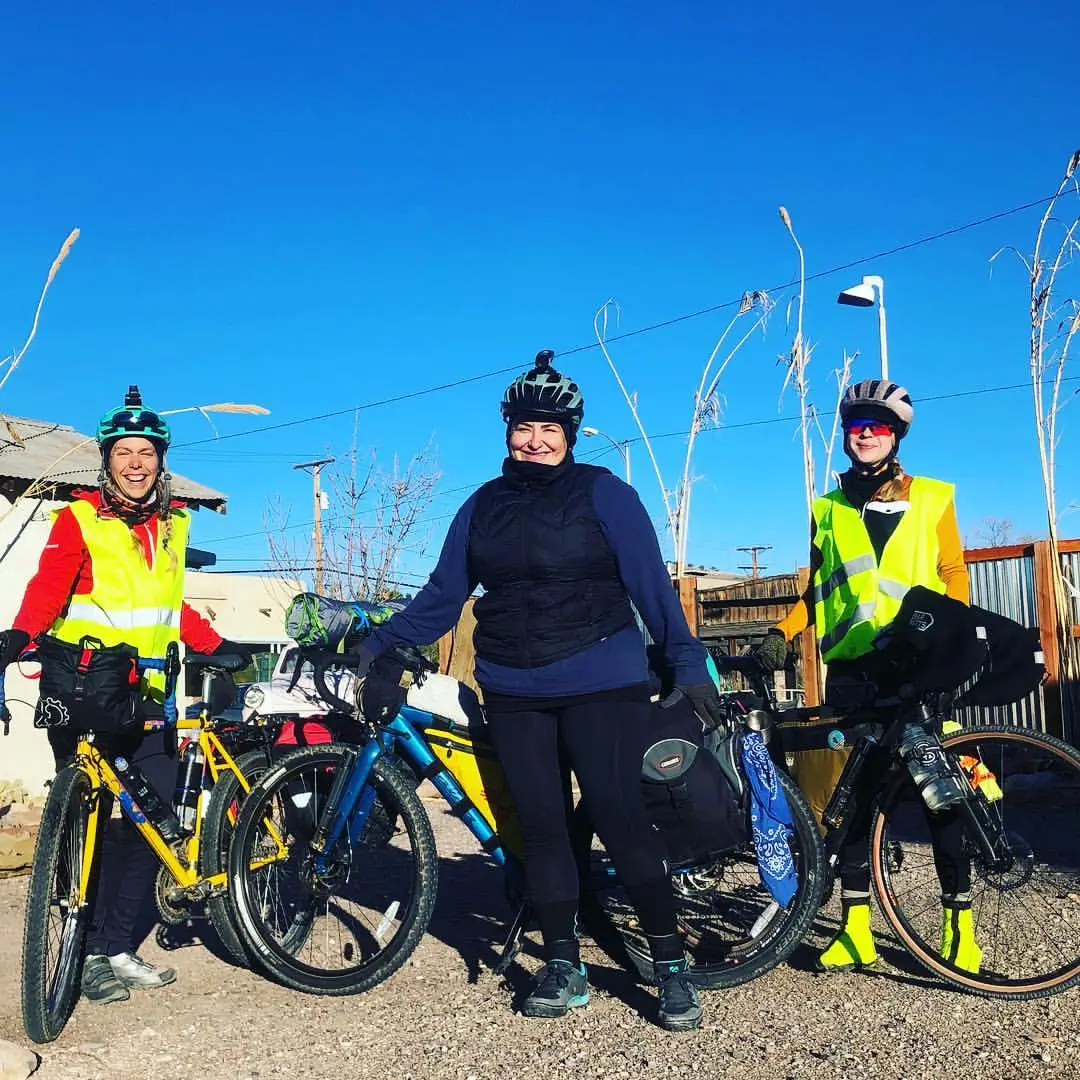

LEFT: Rubio and the Swedish bodyguards in San Antonio, New Mexico, 2019. (Courtesy of Angelica Rubio) RIGHT: Farmland near Lake Arthur. (Molly Montgomery / Searchlight New Mexico)
As they pulled into town, Representative Rebecca Dow (R-Truth or Consequences) met the group on her bike and led them to a brewery. Rubio had been worrying about how people in the communities along the road would receive her — whether they’d write her off as a leftist, whether they’d expect her to write them off. But at the brewery, Democrats and Republicans alike had gathered to greet her and take selfies. They shook hands and drank beer together.
That night, trying to fall asleep in an empty storefront where a friend of one of the Swedish bodyguards was letting the three women stay, Rubio got homesick. “The session would be starting in a week,” she says. “Things really started to hit.”
She missed Lennon and being able to cook her own meals. La Bajada — the 600-foot mesa that rises from the grasslands between Albuquerque and Santa Fe — loomed in her mind. She started to question whether she’d make it over the hill. “Riding bikes has always been sort of intimidating, because, traditionally, it’s mostly white dudes in tights,” she says.
One of the Swedish bodyguards, Susan, kept saying: “It’s slow and steady. Slow and steady.” Rubio repeats the line to herself now when she makes policy decisions.
The purple three-piece suit
Rubio’s ability to say no to lobbyists and fellow lawmakers is something she’s been practicing all her life.
Her parents, Eduardo and Maria, met in the 1950s, while they were working on a cotton farm in Dexter, New Mexico. Maria had immigrated from Ojinaga, Mexico; Eduardo was born across the border, in Presidio, Texas, to a family with mixed immigration status. He’d worked with Maria’s mother in a bakery in Ojinaga but didn’t know anything about Maria until he saw her in the fields. She was 17 and he was 20. Within five years they had four kids — six years after that, they had a fifth — and eventually settled in Lake Arthur.
While Maria stayed home with the kids, sometimes taking cleaning jobs, Eduardo worked on alfalfa, cotton and produce farms. He worked so hard that when he retired, years later, the farm owners had to hire two men to replace him. “My dad likes to brag,” Rubio says. “He shouldn’t brag about it, because, to me, it’s an injustice.”
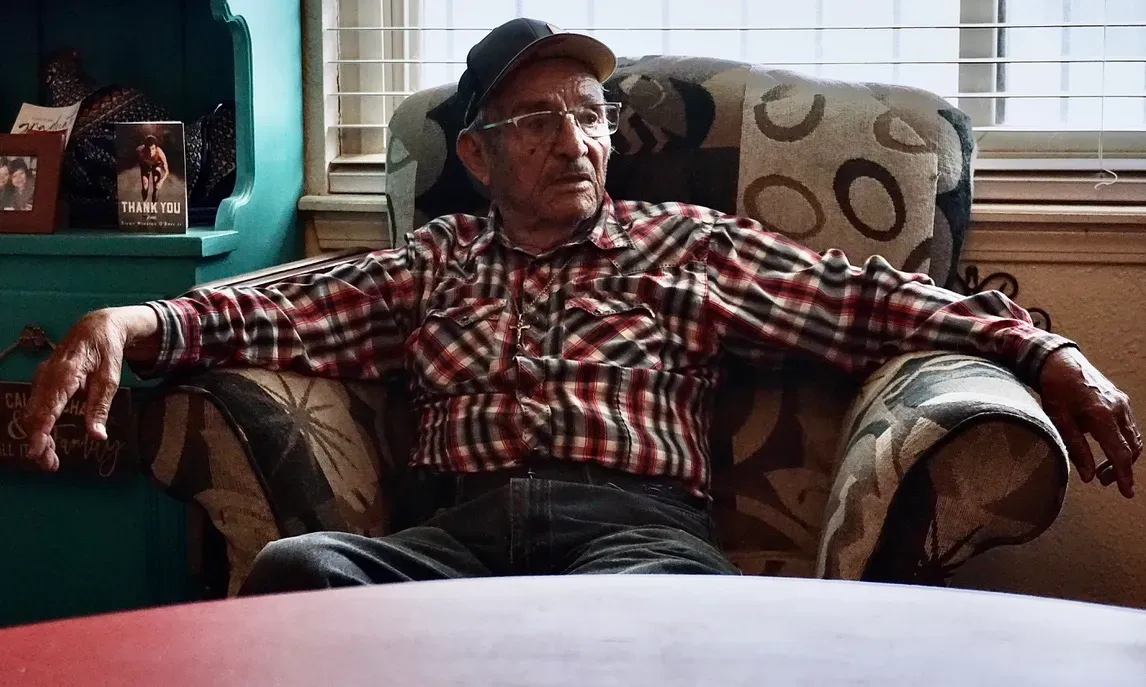
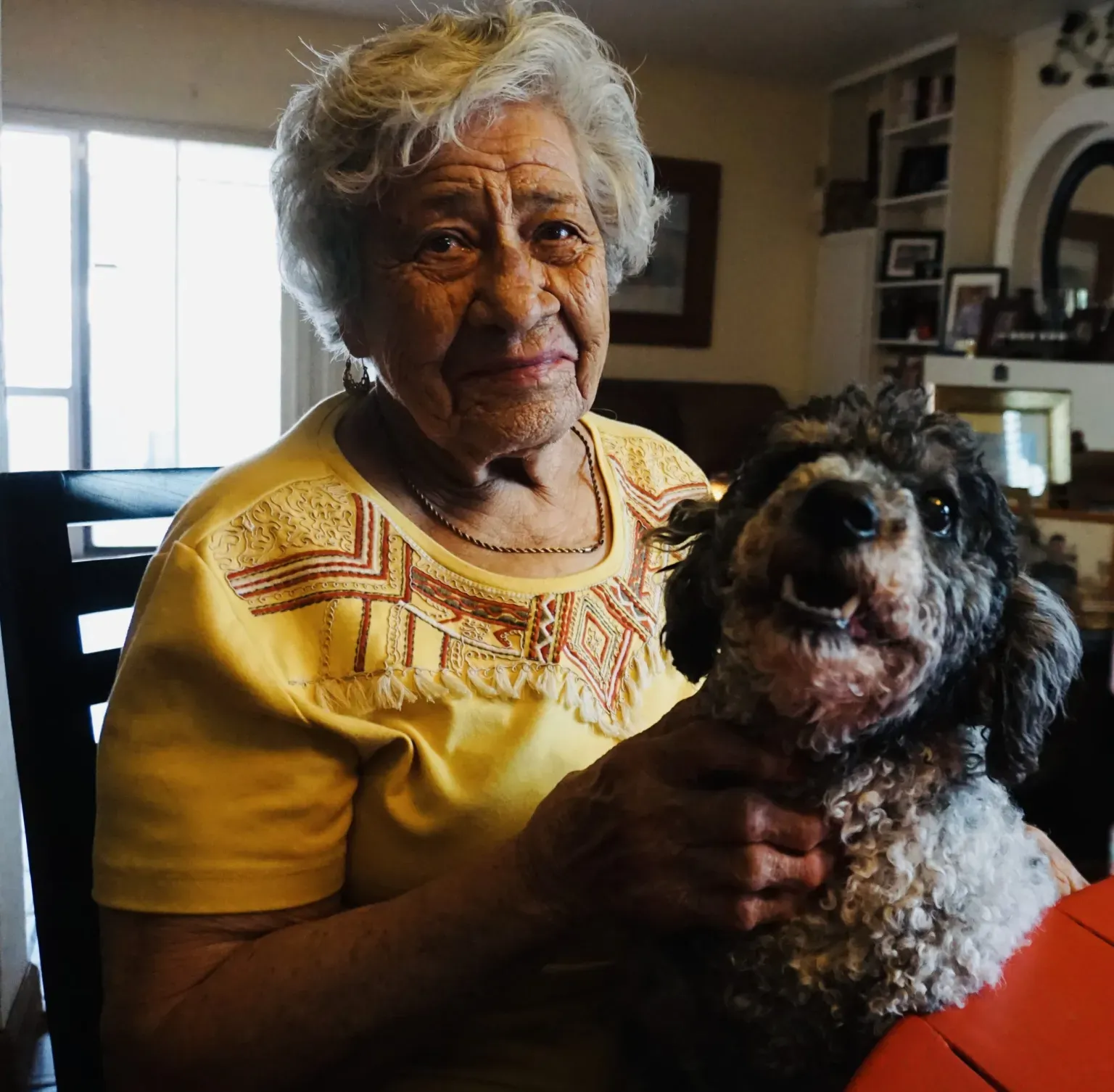
LEFT: Eduardo Rubio. (Molly Montgomery / Searchlight New Mexico) RIGHT: Maria Rubio. (Molly Montgomery / Searchlight New Mexico)
Twenty years after they got together, in 1977, Maria received a miraculous sign that launched her into contemporary New Mexican folklore. She was making fresh tortillas for breakfast. It was a difficult period. Poverty, young parenthood and the language barriers and discrimination they’d experienced as immigrants had taken their toll. Eduardo was drinking heavily; Maria was depressed.
Standing over the stove, Maria saw the face of Jesus in a burn mark on a tortilla. He had long hair and was wearing the crown of thorns. Eduardo and her daughter Rosario examined the tortilla. They agreed: it was Christ.
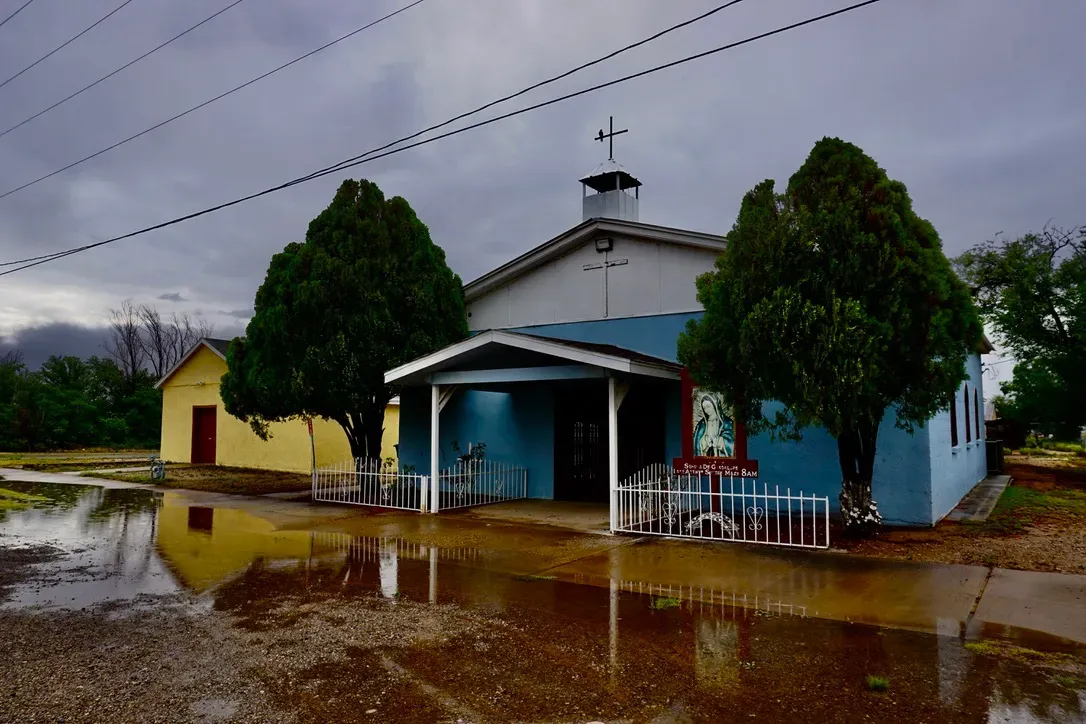

LEFT: Nuestra Señora de Guadalupe Catholic church in Lake Arthur. (Molly Montgomery / Searchlight New Mexico) RIGHT: In 1977, Maria Rubio saw the face of Jesus on this tortilla. (Courtesy of Angelica Rubio)
She brought it to the priest at the Catholic Church across the street so he could bless it, and word of the mark spread so rapidly that, by the evening, dozens of people were lined up outside the house to have a look. In the days and weeks and years ahead, cars lined the streets around the Rubios’ home and people knocked on their door at all hours. Maria framed the tortilla. It never got moldy.
Many visitors, particularly Latino Catholics, arrived with reverence for the sign, praying and asking for healing. But as the story spread around the country, Maria and the tortilla became objects of derision. In the years ahead, Phil Donahue and Oprah would interview her with Rosario; the talk show hosts and their viewers laughed at the vision and mocked Maria.
For the Rubios, the occurrence was a beacon. Eduardo tried to stop drinking for the first time (he stopped for good later on). A doctor had told Maria that she wouldn’t be able to have more children; two years after Jesus appeared, Angelica was born.
As Angelica grew older, she experienced the tortilla obsession as an inconvenience. She developed an after-school ritual of watching re-runs of “Three’s Company” over a bowl of instant ramen. Time to herself was rare, and visitors clamoring to see the tortilla frequently interrupted the few moments she had alone.
“You would just have a rando show up at the minute that I was about to eat a bowl of ramen,” she says. “And it was always at a time where I felt like I just needed to be in my moment.”
It was also an embarrassment. In the fourth grade, she found out that a boy she had a crush on was calling her “the tortilla kid.” That revelation devastated her. (She’s since owned the name: a blog she wrote for years is called “The Tortilla Kid.”)
The presence of visitors was part of a broader set of obligations that she was learning to navigate. Because her parents mostly spoke Spanish, she often had to interpret for them. At the doctor’s office, she’d translate between healthcare workers and her mom. “I was just like, ‘Why am I being asked this question?’ Really personal questions that a child should not have to be asked.”
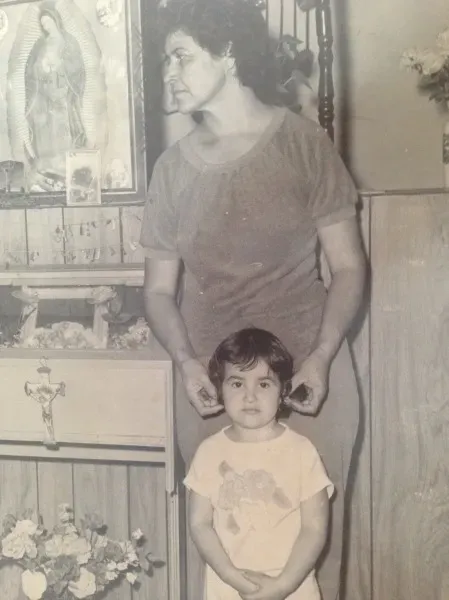
Angelica is proud that she learned Spanish, but she wishes the United States had systems in place that would be easier for people who only speak one language to navigate, so that children wouldn’t have to be put in adult situations. She wonders if the inhospitality first-generation Latino children have experienced in this country, and the push to assimilate, has led them as adults to support Trump.
“There’s so much self-hate when it comes to our communities around politics,” she says. “And it’s sad, because I think a lot of it is based on trauma that they just haven’t been able to unpack, and we’re not providing them an opportunity to unpack.”
At the same time that Rubio was learning roles of obligation, she was also learning how to say no. Eduardo had a nightly tradition of asking his children to kneel and take his boots off when he came home from work. One day, Angelica decided not to do it. “This is the time, I tell people, where I made my dad a feminist,” she says. “One day, I was like, ‘You can take your own boots off. I’m not gonna do it.’”
This early resolve bloomed into a confidence about what she could do. In high school, she wore a purple three-piece suit to signal that she would one day be a public servant. Rosario once got invited to a campaign party at the house of Tim Jennings — the current mayor of Roswell, who at the time represented parts of Eddy, Lincoln, Otero and Chaves Counties in the state senate — and asked Angelica if she wanted to come. Angelica walked into the party and said, “Hello, I’m the future governor of the state of New Mexico.”
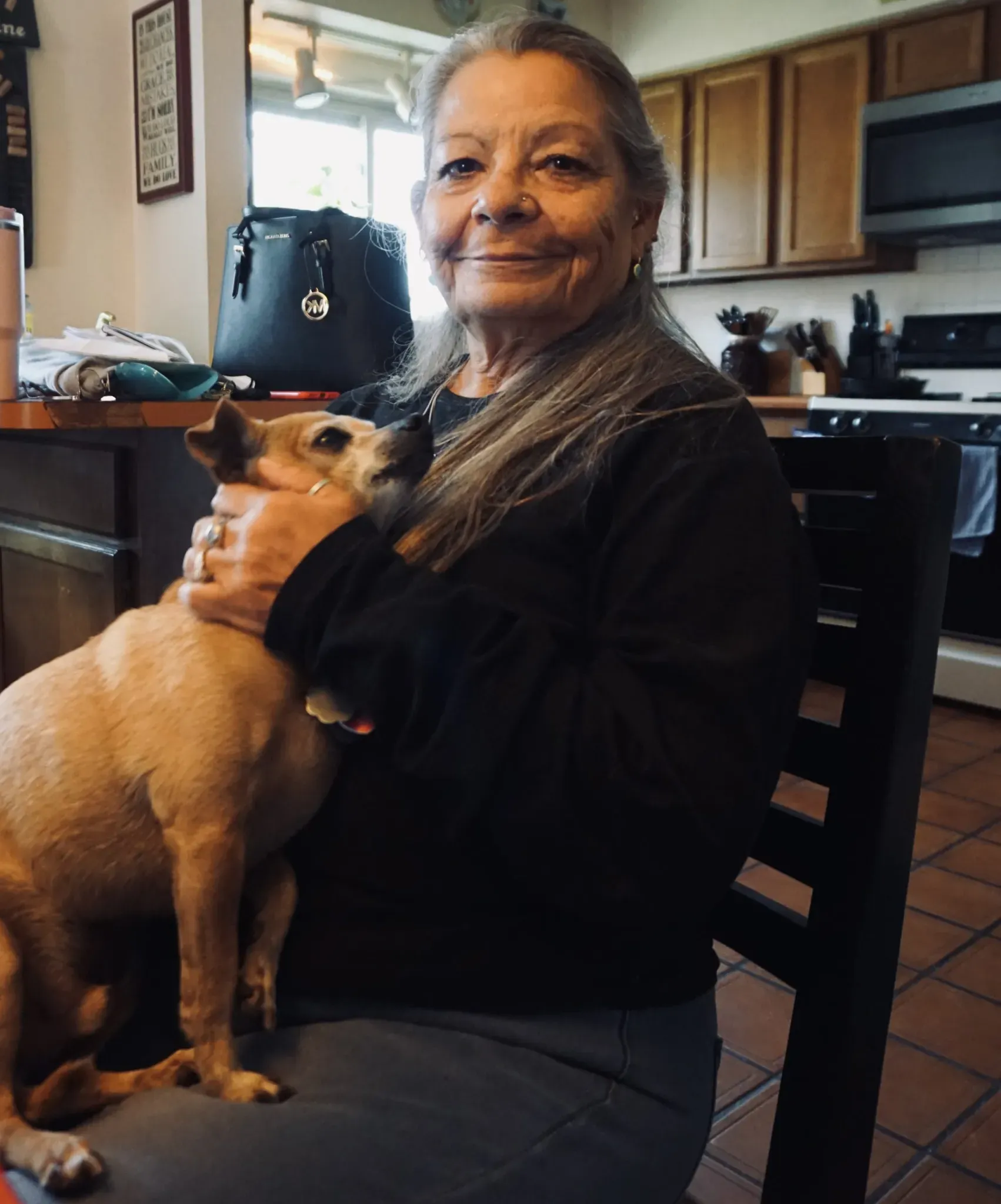
Thinking about the memory, Angelica says, “I wish I still had her confidence.”
She speculates that she’s too far to the left to be elected governor, and, through her organizing work, has come to believe that helping to build community movements is a more effective way to change the world.
But you can still hear that early confidence in her decision to bike almost the entire length of the state, and in her moral positions, and in the questions she asks about decisions that others fall in line behind.
Feelings of obligation are “just ingrained in us,” she says. “I feel like it’s a bigger conversation that we’re having, even as a nation. Like, we’re supposed to bomb Iran, we’re supposed to do all these things. And it’s like, ‘No, there’s choices.’ We’re allowed to have choices.”
‘Not a Democratic loyalist’
Rubio shot down a hill into Nogal Canyon, the massive dip north of Truth or Consequences, where the hills roll into a sandy flatland and then the land gathers again into hills. With cars whizzing past her, she coasted into the valley. As she hit the incline, her wheels stopped spinning. She repeated Susan’s advice — “slow and steady” — and told herself not to pay attention to the fact that the Swedish bodyguards were moving faster than she was. She climbed and climbed. At an exit at the top of the hill was an overpass. Rubio got off her bike and took a picture of it, the New Mexican flag on her frame high above the road.
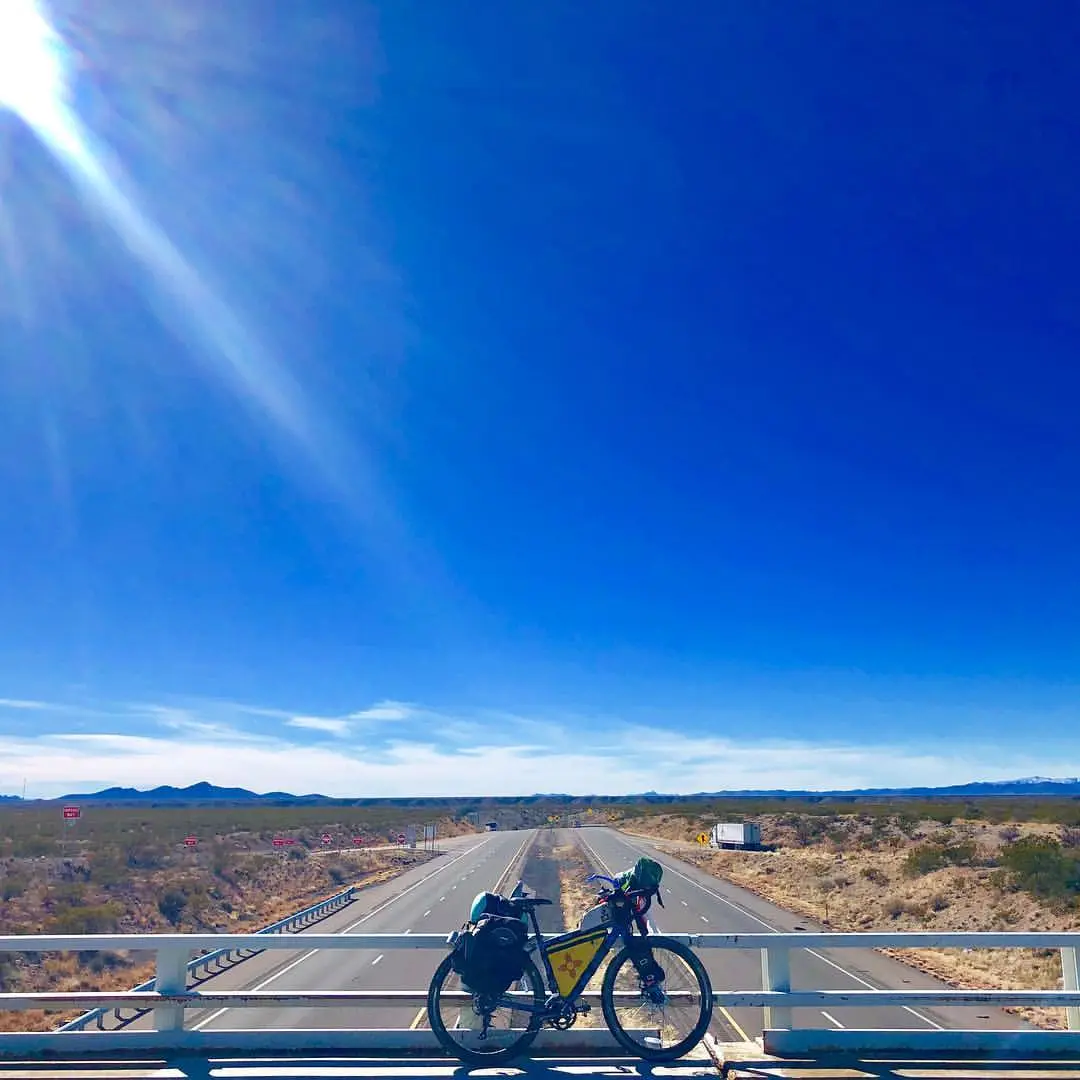
As hard as she was riding, she was behind schedule. At the Owl Bar and Cafe in San Antonio, she was supposed to meet with residents of the area, many of whom were conservative. Representative Gail Armstrong (R-Magdalena) was hosting the town hall for her. As she rode past the Bosque del Apache, where sandhill cranes were swooping down into the marshes, trilling and honking, the sun started to set. The sky turned pink and the air got cold.
“I just remember starting to feel anxiety, because I was like, ‘I’m gonna be late,’” she says. “I didn’t want to be late.”
By the time she reached San Antonio it was dark. People were getting restless. Some had already finished their dinners. An attendee remarked that Rubio is from an urban area — with apprehension, maybe, or possibly disdain — but Armstrong said Rubio is actually from Lake Arthur.
Legislators that session were debating whether to legalize cannabis. Rubio supported the legalization; someone at the bar voiced opposition to the measure. Exhausted, without thinking, she said, “Look, it’s coming. Whether you like it or not, it’s going to happen. So we either need to figure out how we’re going to do it right, or we’re going to be left behind.”
The crowd went quiet. But as the evening wore on, it became clear that the directness of her comment may have won some respect. She made jokes about growing up in a big family in Lake Arthur and told people about her high school beating Mountainair in a 1993 football championship. They talked about what it means to be good stewards of the land, and how young people could better access outdoor recreation to become the next stewards.
“By the time the town hall ended, I feel like people felt really glad that they had attended,” she says. “I would hope that they didn’t see me as a Democrat or a progressive or some lefty, but somebody who actually cared about the community.”
In the days ahead, there would be town halls in Belen, with then-Representative Kelly Fajardo (R-Belen), and in Albuquerque’s South Valley, with Representative Andrés Romero (D-Albuquerque). The ride into Santa Fe itself was undramatic. She made it up La Bajada and through 13 miles of rolling hills to an Airbnb.
Along the way, fellow democrats criticized her for hosting town halls with Republicans and not inviting them. But promoting the Democratic party was never one of Rubio’s goals for the ride.
“When I had made this decision, it wasn’t political,” she says. “It was me wanting to engage with other communities and bring southern New Mexico to the state capitol.”
She was apprehensive about what the differences between her approach and those of other Democrats would mean for the session ahead — an apprehension that, in the following years, became conviction. “I was having my own internal revolution during that ride,” she says. “I’m actually not a Democratic loyalist. I never have been; I never will be.”
She and the Swedish bodyguards took the Rail Trail into Santa Fe and eventually arrived at Galisteo Street, where a crowd rode with them to the Roundhouse. They circled it.
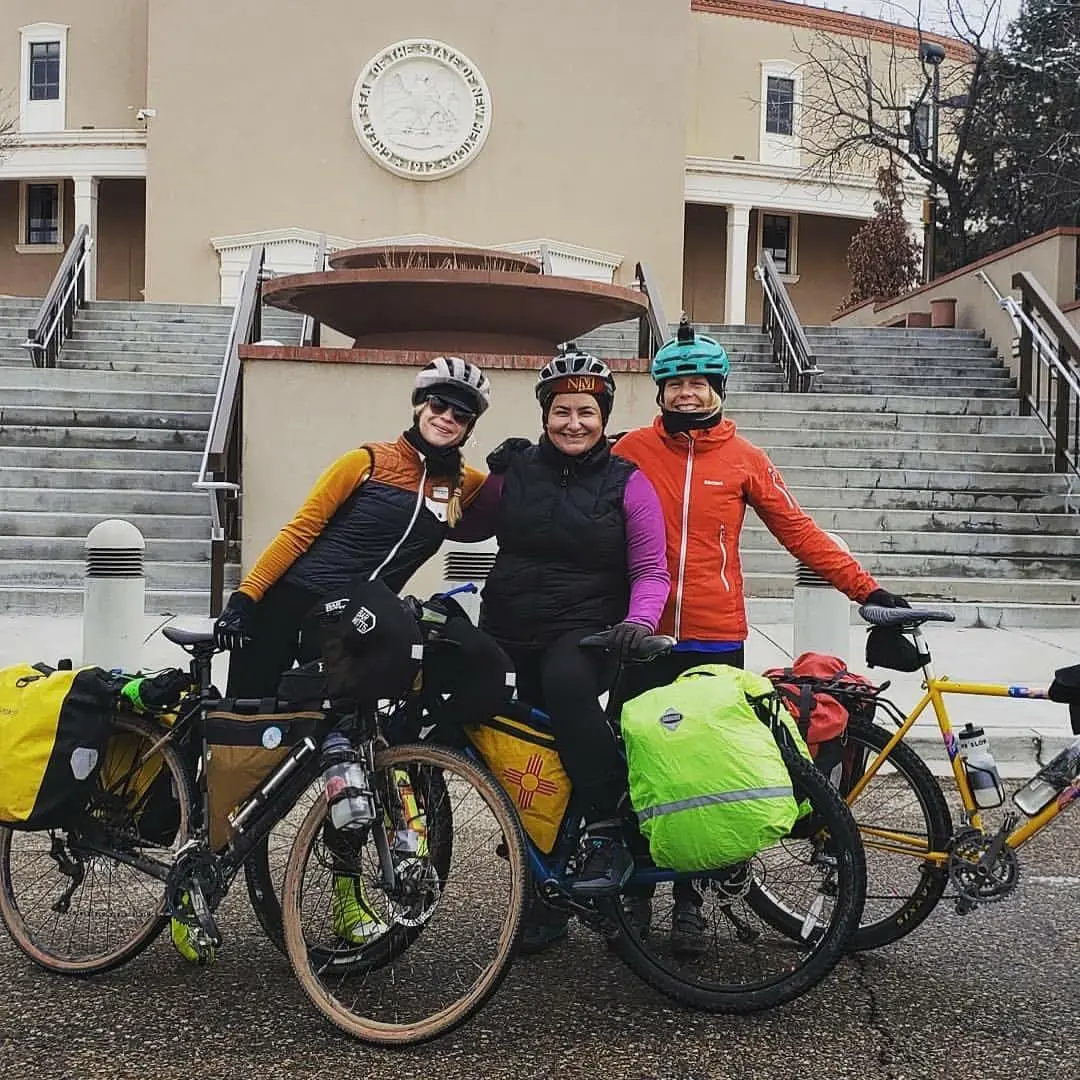
Six years later, Rubio wonders whether the welcomes she received and the town halls Republicans hosted could still happen. “The divide is so much larger than at the time,” she says. “I don’t want to say that I’m cynical when it comes to the legislature. I just remember having so much more hope.”
A new legislature
The legislature can be a lonely place. The divides between southern and northern New Mexico can feel especially stark.
“There are many instances where there is a disregard for southern New Mexico, or we’re an afterthought,” says Senator Carrie Hamblen. She recalls a moment where someone in the Rural and Economic Development and Policy Committee made a comment about how the north could “help” the south. “I was like, ‘I would encourage you to change that narrative,’” Hamblen says. “Because I can tell you all the things that are happening down in the south.”
When Rubio first got elected, she wrote a story about trying to find good menudo in Santa Fe. She finally found some on Airport Road, where many Mexican families live. “I feel like that’s a metaphor for what it’s like navigating the structures within politics,” she says. “Because so many of the issues that I bring up don’t resonate with people up north.”
At the Roundhouse, senators and representatives work late into the night and have to juggle the interests of constituents with the plans of the politicians around them. Lobbyists, eager to enact their agendas, keep an eye out for young lawmakers who are trying to establish themselves and find community.
“The first thing that came to me is sharks,” Rubio says. “They’re just kind of patrolling, trying to get a moment with a new legislator to reel them in. That’s when they bring out the prime rib, the open bar.”
She believes that many discussions at the Capitol are performative. “I feel like Santa Fe is just a bunch of politicians wanting to hear themselves speak,” she says.
The structure of New Mexico’s legislature — with legislators traveling hundreds of miles to get to the Capitol, with a per diem stipend but no salary — was set up by men in the early part of the twentieth century.
This year, for the first time, the majority of state lawmakers are women. The cohort is trying to imagine a new structure that would make it easier for women — who often have to balance lawmaking with caretaking obligation and full-time jobs — to serve.
“It’s been a huge moment of celebration for us to have achieved this level of progress and be in the national spotlight for the number of women who are serving in our legislature, but it’s also a moment of reflection,” says Representative Reena Szczepanski (D-Santa Fe). She notes that the legislature was created in 1912, when women didn’t have the right to vote, and its structure hasn’t changed much since then.
“I think we all want a legislature that really reflects every new Mexican, which means we need working people,” she says. “We need moms, we need grandmas who are raising their grandkids.”

New Mexico is currently the only state in the nation with unsalaried legislators, and Rubio is leading an effort to change that by professionalizing the legislature. Because it’s difficult to hold a full-time job and represent a district, many state lawmakers are independently wealthy and experience different daily realities than the people they represent.
“One of my districts is considered an area that, compared to the rest of the state, is fairly low-income,” Rubio says. “I think that they deserve an opportunity to have representation from someone who has similar lived experiences.”
Rubio is also imagining other ways to shrink the distances between legislators and constituents. During the last legislative session, she co-sponsored a successful bill permitting semi-open primaries, so that voters who don’t want to identify as Democrat or Republican — almost 25 percent of New Mexico’s voters — won’t be alienated during party primaries. And she dreams of what it would mean if, each year, legislative sessions occurred in a different place in the state.
“I can’t say we’ll do it in the next five to ten years,” she says. “But I feel like there’s a possibility. If anything, I want to be that tool to be able to help the legislators to have that curiosity of what else is possible.”
Molly Montgomery is a reporter for Searchlight New Mexico.
Heinrich, Luján back bill to restore Medicaid funding for Planned Parenthood New Mexico senators join colleagues in pushing to repeal a provision that blocked reimbursements for family health services.
Deming teen charged in federal drug, firearms and immigration cases Authorities say the teen was involved in fentanyl trafficking and firearm possession after reentering the U.S.
New Mexico measles cases hit 100, health officials urge vaccination State health officials emphasize the importance of MMR shots amid a rising outbreak.

